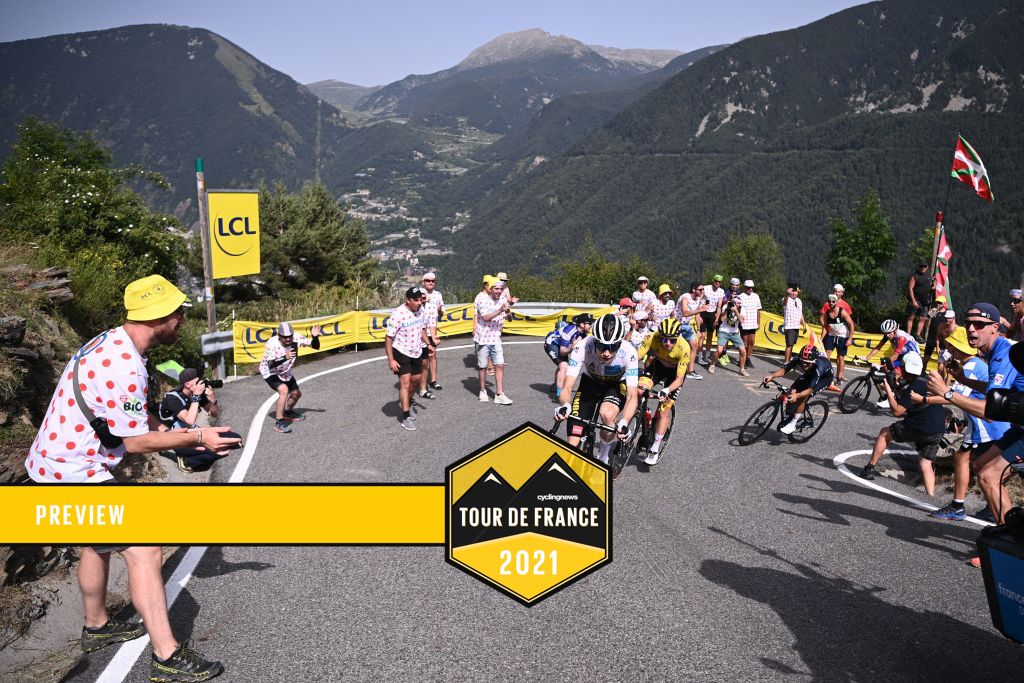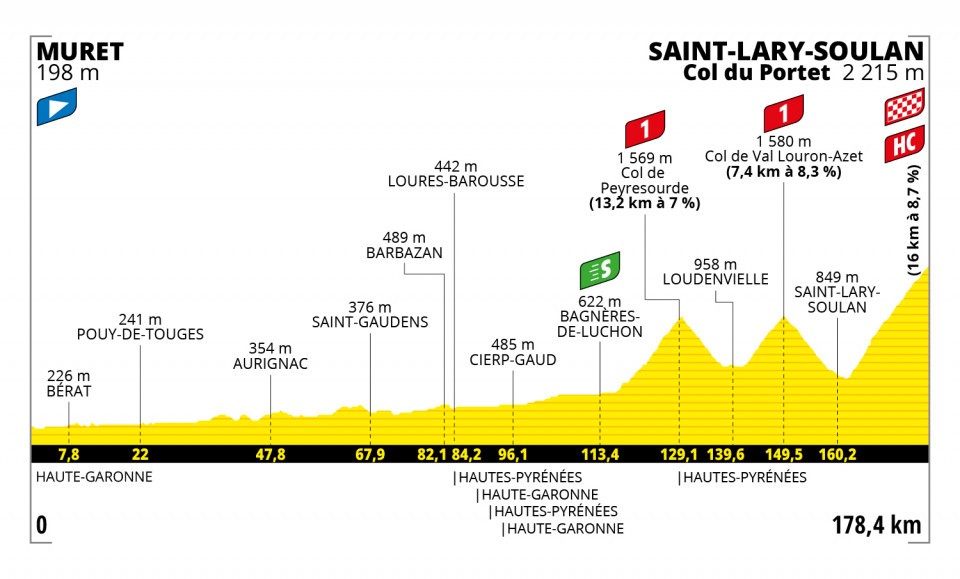Tour de France summit finish at Col du Portet - Preview
Outlasting rivals may take precedence over attacking them on final 'brutal' climb of stage 17 in Pyrenees

Another day, same difference. For more than a week on this Tour de France, Tadej Pogačar (UAE Team Emirates) has maintained precisely the same advantage over the three men closest to him in the overall standings and he duly came home alongside Rigoberto Uràn (EF Education-Nippo), Jonas Vingegaard (Jumbo-Visma) and Richard Carapaz (Ineos Grenadiers) once again in Saint-Gaudens on stage 16.
The terrain is rather more onerous on stage 17, however, and the summit finish on the mighty Col du Portet should finally provide a degree of separation in the tight battle for the podium, though it remains to be seen if anyone can make even the slightest dent in Pogačar’s commanding 5:18 overall lead.
Vingegaard (third at 5:32) did at least deal a glancing blow to the yellow jersey’s aura with his stinging attack atop Mont Ventoux on stage 11, even if the long descent to the finish wiped out his lead. Since then, mind you, Pogačar looked remarkably comfortable in swatting away attacks in Andorra on Sunday, and his air of invulnerability feels somewhat restored ahead of the Tour’s final brace of summit finishes in the Pyrenees.
Wout van Aert’s late forcing aside, there were few frissons among the general classification men on Tuesday’s trek from Andorra over the Col de Porte, Col de la Core and Col de Portet-d’Aspet. In a most arduous Tour, it seems clear that many minds were already trained on the horrors to come on stages 17 and 18. Even Wout Poels, so aggressive in his pursuit of the polka-dot jersey, sat out the breakaway on Tuesday. “I have been able to save up my legs for the next two days,” he said.
It’s all relative, of course. This Tour has been especially attritional, and anecdotal evidence from several teams’ rest day training rides suggests a notable level of general fatigue in the peloton. With the Col de Peyresourde, Col de Val Louron-Azet and Col de Portet all on the menu on Wednesday, the stage could be about outlasting rivals rather than attacking them.
“We have a big day tomorrow,” Pogačar said in Saint-Gaudens. “I think it will even be the hardest day of this Tour de France. I know the last climb of the Col du Portet because I was able to do a recon. We’ll see how it goes, I’m ready for everything.”
Repeat of 2018

The Col du Portet first featured on the Tour as a summit finish in 2018 and stage 17 is essentially a reprise of that route, even it is rather longer. Three years ago, ASO designed a stage just 65km in length – complete with an underwhelming ‘start grid’ – that took in the climb of Peyragudes (the Peyresourde by another name, essentially) and the Val Louron-Azet en route to the final climb.
The latest race content, interviews, features, reviews and expert buying guides, direct to your inbox!
This time out, the stage gets underway in Muret, south of Toulouse, and there is a relatively gentle preamble to the climbing, which only begins after 120km with the ascent of the Col de Peyresourde (13.2km at 7 per cent). After a rapid descent to Loudenvielle, the road climbs again, this time up the category 1 Col de Val Louron-Azet (7.4km at 8.3 per cent), where Miguel Indurain claimed his first yellow jersey on the 1991 Tour.
Those efforts will weigh in the legs ahead of the fearsome hors categorie ascent of the Col du Portet, which climbs above Saint-Lary-Soulan for 16km at an average gradient of 8.7 per cent. Chris Froome’s flagging hopes of beating teammate Geraint Thomas to the 2018 Tour essentially ended on this ascent three years ago, and he outlined its demands earlier this week.
“It’s brutal. It’s a long climb and goes above 2000 metres, so it’s really going to be one of the most testing climbs we have on this year’s Tour and it’s also one of the only summit finishes we have in this year’s Tour,” said Israel Start-Up Nation's Froome. “Coming that late in the race, it’s really going to be somewhere where the GC guys can test each other. And if there are any cracks, that’s where they’re going to show.”
It’s difficult to imagine Pogačar surrendering his yellow jersey at this late juncture in the race, but the altitude might give men like Rigoberto Uràn (second at 5:18) and Richard Carapaz (fourth at 5:33) reason to believe this is the best place to test the 22-year-old’s resolve.
Pogačar, for his part, has made no secret of his preference for racing in cold and rainy conditions, and the weather forecast for Saint-Lary-Soulan on Bastille Day – chilly and wet – would appear to be to his liking. Whatever the weather, of course, the Col du Portet is a climb that offers virtually no respite, save for a brief lull midway up. The gradient quickly hits 10 per cent after a kilometre or so of climbing and it barely relents thereafter. Cruelly, the road kick up just as viciously inside the flamme rouge.
“It’s not like any other climb. It’s got its own characteristics that make it really tough,” said Froome. “It starts off pretty hard and you don’t get any recovery until about halfway up. You get a little bit of rest there, but then straightaway again you’re climbing the second half, which is just as hard again. It’s really tough.”
Nairo Quintana soloed to victory on the Col du Portet three years ago after escaping at the base of the climb, while the yellow jersey group gradually fragmented as the climb grew long and their air grew thin. Team Sky (now Ineos Grenadiers) dictated the terms and conditions on that occasion, but the team has been singularly unable to do so on this race thus far, beyond some curious stints of pace-making that served more to help Pogačar than to hinder him.
Considering the talent at their disposal, one imagines Ineos Grenadiers will look to conjure up something in this race’s dying days, but the sheer difficulty of the Portet means that individual strength is likely to be key as Vingegaard pointed out: “Tomorrow it’s going to be man against man on the last climb.”

Barry Ryan was Head of Features at Cyclingnews. He has covered professional cycling since 2010, reporting from the Tour de France, Giro d’Italia and events from Argentina to Japan. His writing has appeared in The Independent, Procycling and Cycling Plus. He is the author of The Ascent: Sean Kelly, Stephen Roche and the Rise of Irish Cycling’s Golden Generation, published by Gill Books.